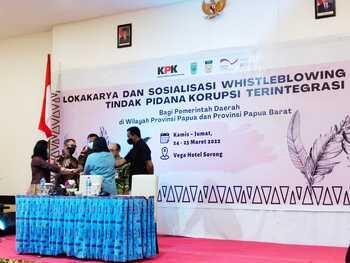Context
Indonesia has some of the most extensive tropical forest in the world. More than half of them are designated production forests (hutan produksi) that can be commercially used (the rest being protected or conservation forest).
The forestry sector, which includes timber from production forests and palm oil plantations, is an important source of public revenue in Indonesia. However, corruption has facilitated illegal logging and undermined sustainable allocation and use of land. This causes significant state losses. Corrupt forestry practices are often ignored or condoned.
As part of its reform agenda, the Indonesian Government has introduced measures for the improved management of natural resources.
The project aims to simplify access to justice and the anti-corruption system, as well as promote the political rights of citizens.
Objective
Indonesia is becoming more effective at preventing corruption in the forestry sector.
Approach
The project targets the population in the two pilot provinces Papua and West Papua. It concentrates on three areas:
- Analysing laws and procedures, implementing international environmental and anti-corruption standards, and improving the application of laws in coordination with the relevant directorates of the KPK.
- Supporting the development of skills and knowledge of provincial and local state actors, whose tasks and duties are to administer and control the forest, streamline planning, mapping, and licensing procedures according to the law, and work with local communities to inform the local population about their economic chances and social rights.
- Supporting the building and functioning of local forestry committees (LFC) in four pilot districts, involving all relevant state and non-state actors in forest administration, environmental development and economic use.
Last update: August 2022
